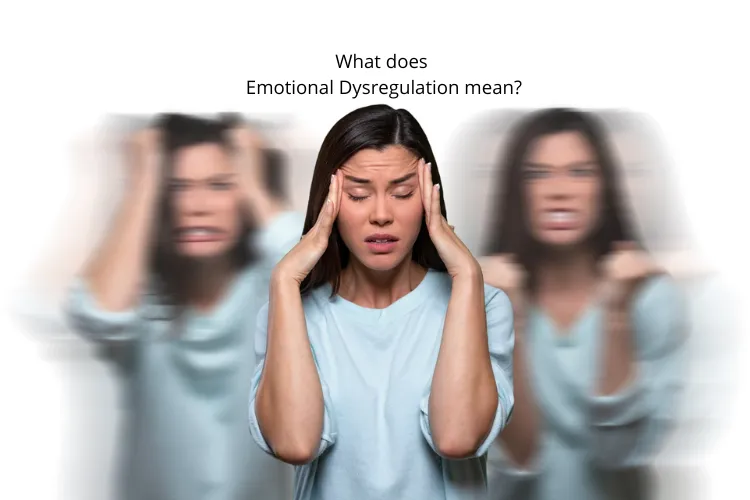Do you have trouble controlling your emotions? Have you ever experienced a range of feelings all at once? Have your emotions ever entirely overtaken you? Do you ever wonder why your emotions seem dysregulated (or out of control)? This gave birth to the term dysregulation, which the American Psychological Association defines as “any overwhelming or otherwise poorly managed mechanism or reaction,” with Emotional Dysregulation being a typical kind of dysregulation.
What is Emotional Dysregulation and its Symptoms?
Emotional Dysregulation is a condition that alters how people feel and regulate their emotions. It is common in children and teens, and it can linger into adulthood. When a person becomes emotionally dysregulated, they may overreact unnaturally to environmental and interpersonal barriers, such as exhibiting bursts of anger, sobbing, accusing, passive-aggressive acts, or initiating conflict, and it is quite unusual for them to perform poorly on reality testing this is because sensory pathways are shut off during a period of high emotional reactivity. It should be underlined that when we are triggered, we all have the potential to become dysregulated. However, numerous stressors exist for certain people, particularly those with a history of psychological trauma; also, periods of dysregulation may be prolonged, causing serious disruptions in relationships and everyday functioning. Emotional dysregulation can indeed cause or intensify depression and anxiety. Hence the Common Symptoms of Emotional Dysregulation:
• Experiencing strong emotional reactions to events that would not normally affect other people
• Mood swings
• Feeling overwhelmed by emotions
• Having intense emotions that are difficult to control
• Inability to cope with stress
• Depression (loss of interest, poor concentration, etc.)
• Anxiety (Breathing rapidly, trouble sleeping, trembling, increased heart rate, nervous, restless or tense, etc.)
• Self-harm
• Excessive substance use
Experience Online Psychologist
What Causes Emotional Dysregulation?
• Early childhood trauma refers to traumatic experiences that occur in a person’s early years of life. This is regarded as the most essential stage of human development.
• Child neglect is a type of caregiver abuse that results in a deprivation of a child’s fundamental requirements, for example, a lack of proper attention, health care, clothes, or shelter, as well as other physical, emotional, social, educational, and safety needs.
• Traumatic brain injury is a type of brain dysfunction induced by an external force, most notably a forceful trauma to the head.
• Chronic invalidation: When a person’s opinions and feelings are rejected, ignored, or ridiculed, they feel chronically invalidated.
• Biological aspect: Experts claim that when you have Emotional Dysregulation, some neurotransmitters lose their ability to act as “emotional brakes,” allowing you to remain in a longer “fight or flight” reaction. When this happens, the pre-frontal cortex, the part of the brain responsible for emotional regulation, is essentially turned off under stressful conditions.
Disorders Related to Emotional Dysregulation
A borderline Personality Disorder is a mental health problem that impacts how you think and feel about yourself and others, making daily functioning challenging. It includes self-esteem issues, problems managing emotions and behavior, and a history of unstable relationships.
Post-Traumatic Stress Disorder (PTSD) is a mental disorder caused by witnessing or suffering a potentially fatal traumatic incident. In the majority of instances, there is significant emotional instability. Flashbacks, nightmares, anxiety, uncontrolled negative thoughts, loneliness, and emotional numbness are some of the symptoms.
Disruptive Mood Dysregulation Disorder (DMDD): Childhood illness can cause significant mood swings and violent temper outbursts. It can reduce a child’s quality of life and may necessitate therapeutic intervention.
Obsessive-compulsive Disorder (OCD) is a mental ailment defined by recurring unwanted thoughts, obsessions, or the need to do something again. This disturbance of the prefrontal (thinking) region of the brain can result in substantial Emotional Dysregulation.
In traumatic brain injuries with frontal lobe abnormalities, there is emotional disruption as well as attention deficit issues, impulsivity, poor insight, a lack of inhibition, impaired judgment, and depressive symptoms. A brain injury, battlefield trauma, infection, cancer, stroke, past drug or alcohol use, or neurodegenerative disorders can all induce frontal-subcortical issues. Explosive wrath is common, especially in people with impulsivity, disinhibition, and Emotional Dysregulation.
What are the reasons for your emotional dysregulation? Find out from our Wellness Experts at Ganeshaspeaks.com.
Treatments for Emotional Dysregulation
Doctors may use psychotherapies to help a person overcome their Emotional Dysregulation. We can divide these therapies into groups:
• Dialectic Behavioral Therapy (DBT) is a popular therapy for BPD that teaches people skills that might help them manage their moods or emotions. People may also learn to become more conscious of inner feelings and thoughts as well as ways to deal with stressful situations. The therapy includes a ‘dialectic’ approach, which implies that he or she accepts the person’s feelings as they are but recognizes the need for change. DBT’s purpose is to assist people in balancing their emotions with reasoning. This can contribute to positive results in stressful situations, and a person may be better able to regulate their emotions as a result. DBT can consist of four components: group sessions, individual treatment, telephone coaching, and a consulting team.
• Cognitive Behavioral Therapy (CBT) rests on the theory that emotion is heavily influenced by our thoughts about our experiences. If you feel yourself spiraling into a negative emotion, it can be helpful to pause, take a step back, and reflect on how your thoughts about your situation might be contributing to your feelings.
• Exercise: Different forms of exercise, such as cycling and running, have been shown to help regulate emotion.
• Breathing: When we are anxious, our breathing becomes quicker and shallower. Research has shown that deliberately deepening and slowing the breath can improve mood
• Yoga combines physical movement with mindful awareness
• Multimodal treatment such as parental interventions and pharmacotherapy
• other therapies, such as analytic group therapy, hypnotherapy, or neurofeedback
“When a man is prey to his emotions, he is not his own master.” – Benedict de Spinoza
Emotional intelligence can transform your life for the better. Speak to our mental wellness experts.
